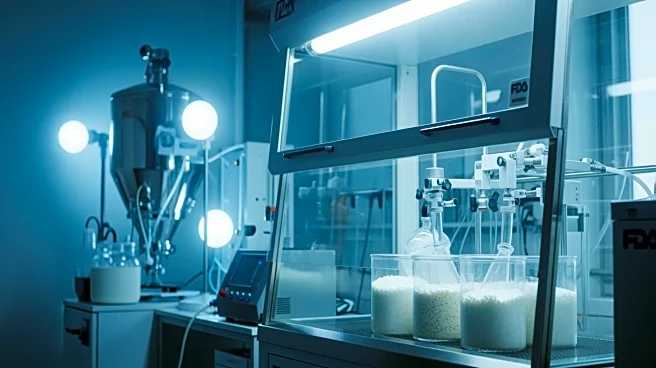What's Happening?
Verley, a company based in Lyon, France, has received a 'no questions' letter from the U.S. Food and Drug Administration (FDA) for its precision fermented dairy ingredients, indicating that these products
are generally recognized as safe (GRAS). This approval allows Verley to commercialize its FermWhey Native and FermWhey MicroStab ingredients in the United States. The FermWhey Native whey protein is designed for nutrition in dairy and non-dairy protein snacks, powders, and ready-to-drink applications. FermWhey MicroStab is a patented whey protein offering heat and acid stability for high protein, low-fat fresh dairy and non-dairy applications. Verley uses strain engineering to produce its fermented ingredients, selecting and genetically modifying microorganisms such as yeast or bacteria, which are then placed into fermentation tanks and fed nutrients. The mixture is filtered and purified to ensure the final product is free from the microorganisms used during fermentation and is not genetically modified.
Why It's Important?
The FDA's 'no questions' letter is a significant milestone for Verley, as it enables the company to expand its market presence in the U.S. with its innovative dairy ingredients. This development is crucial for the food industry, particularly in the realm of sustainable and health-focused products. Verley's precision fermentation approach aims to reduce environmental impact while providing advanced functionalities tailored to diverse dairy product applications. The approval could lead to increased competition in the dairy protein market, potentially benefiting consumers with more options for high-quality, sustainable products. Additionally, it highlights the growing trend of using biotechnology to enhance food production, which could influence future regulatory and industry standards.
What's Next?
With the FDA approval, Verley is poised to enter the U.S. market, potentially leading to partnerships with American food manufacturers and distributors. The company may focus on scaling its production capabilities to meet anticipated demand and explore further innovations in precision fermentation. Stakeholders in the food industry, including competitors and regulatory bodies, will likely monitor Verley's progress and the consumer response to its products. The success of Verley's ingredients could encourage other companies to pursue similar biotechnological advancements, fostering innovation in the food sector.
Beyond the Headlines
Verley's approach to precision fermentation not only addresses environmental concerns but also aligns with consumer demand for clean-label and functional food products. The company's focus on reducing its environmental footprint through biotechnology could set a precedent for other food manufacturers, potentially leading to broader industry shifts towards sustainable practices. Ethical considerations regarding the use of genetically modified organisms in food production may arise, prompting discussions on transparency and consumer education.












